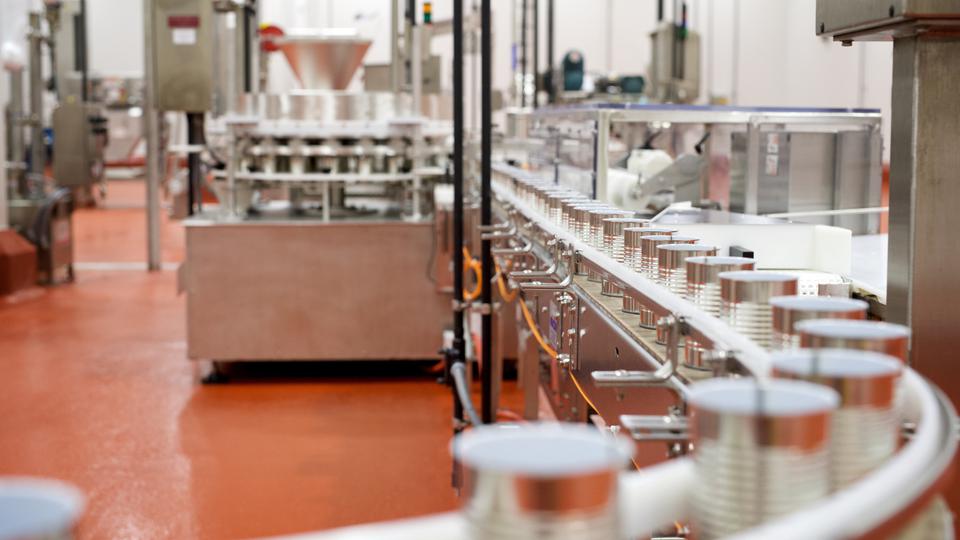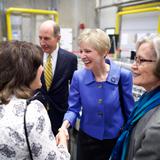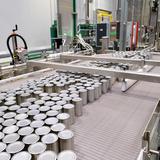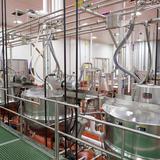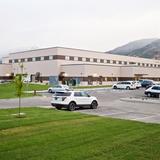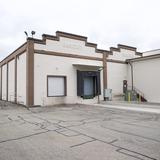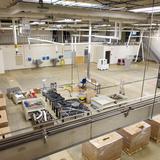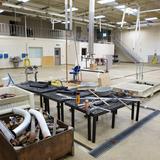Millions of cans of food will be processed every year at a new state-of-the-art welfare cannery in northern Utah owned by The Church of Jesus Christ of Latter-day Saints. The 45,000-square-foot facility, located in the community of Harrisville, was dedicated Thursday, May 18, 2017.
“It reaffirms that we are in the business of caring for people,” said Bishop Dean M. Davies, first counselor in the Church’s Presiding Bishopric, who dedicated the new facility that replaces the aging cannery in nearby Ogden.
Download this Church Welfare Department video: 1080p | 720p | 360p
“It reflects the pioneer heritage of Utah, where men and women help one another. They harvested together, they raised crops together, they shared their food with one another, and we do that today,” said Bishop Davies.
He said the facility stands as a reflection of the moral and spiritual maturity of the local Latter-day Saints and other community residents who are willing to serve the poor.
"Food is more than just a means of satisfying hunger; it is also a metaphor for love and comfort to those who are suffering,” said Sister Jean B. Bingham, general president of the Relief Society. “All will feel the love of their Heavenly Father that is sealed up in the products processed in this facility.”
Sister Bingham participated in the dedication, which was also attended by government leaders, Church representatives, leaders of other local religious congregations and representatives of the companies that built the new facility.
| Bishop Dean M. Davies, first counselor in the Church’s Presiding Bishopric, greets guests attending the dedication of a new cannery in Harrisville, Utah, Thursday, May 18, 2017. 2017 by Intellectual Reserve, Inc. All rights reserved. | 1 / 10 |
She continued, “Those who will receive food produced at this facility will be struggling with a variety of challenges: the elderly and infirm, widows and widowers, single mothers and their children, fathers who are temporarily unable to provide for their families, those who may have just lost homes or possessions in a natural disaster, those who are living in a shelter.”
The new facility was built on 7.5 acres of land near the fields where the Church grows green beans, corn, tomatoes, peaches and other produce and meats that will be canned by staff and volunteers at the cannery to be given to those in need.
"[This cannery is] a community asset. It’s located where there’s a hard-working, industrious people." —Bishop Davies
Bishop Davies said the wet-pack cannery in Harrisville can produce nearly 16 million cans a year to meet the welfare and humanitarian needs of the Church throughout the world.
Other products will include beef stew, beef and turkey chunks, chicken noodle and tomato soup, tomato sauce, cream of chicken and mushroom soup, chili, canned beans and more. Pasta made at the Church’s neighboring pasta plant in Kaysville will be used in the soups.
Don Johnson, director of production and distribution for the Church’s Welfare Services Department, said the cannery has a paid manager and several staff members, but much of the work is done by volunteers and Church-service missionaries who help keep costs down.
“It’s not just a Church asset; it’s a community asset. It’s located where there’s a hard-working, industrious people,” said Bishop Davies. “We’re replacing old technology with a new technology that is more cost efficient and environmentally safe.”
The new facility is more efficient and ensures continued food safety while providing a safe environment for workers.
“It’s a great opportunity for us to be able to have a new facility that meets all the USDA and FDA food safety requirements,” stressed Johnson.
"Food is more than just a means of satisfying hunger; it is also a metaphor for love and comfort." —Sister Bingham
The new cannery is one of six wet-pack facilities in the United States owned and operated by the Church where food canned in liquid is processed for worldwide distribution. Bishop Davies said the Harrisville cannery has room for expansion and is expected to last up to 100 years.
The Church’s first cannery began operating on Salt Lake City’s Pierpont Avenue 80 years ago as part of the Church’s welfare program to help those in need during the Great Depression. At one point, there were 14 canneries, but the new modern facilities can easily produce as much as the previous facilities with less cost. The Ogden cannery was in a building more than 100 years old that had undergone numerous upgrades over the years. Building a new facility was more cost efficient.
The processed food from the new cannery will be transported by truck to the Bishops’ Central Storehouse in Salt Lake City, where it is available for distribution to the Church’s 113 bishops’ storehouses worldwide. Pre-packed food is available for purchase at the home storage centers at the bishops’ storehouses, which have replaced the old dry-pack facilities.
“Although as a general rule, a bishops’ storehouse is to meet the needs of the Church members, we do open our doors to others to provide foods and other goods to help those that have been impacted by natural disasters and other life-threatening conditions,” emphasized Bishop Davies.

